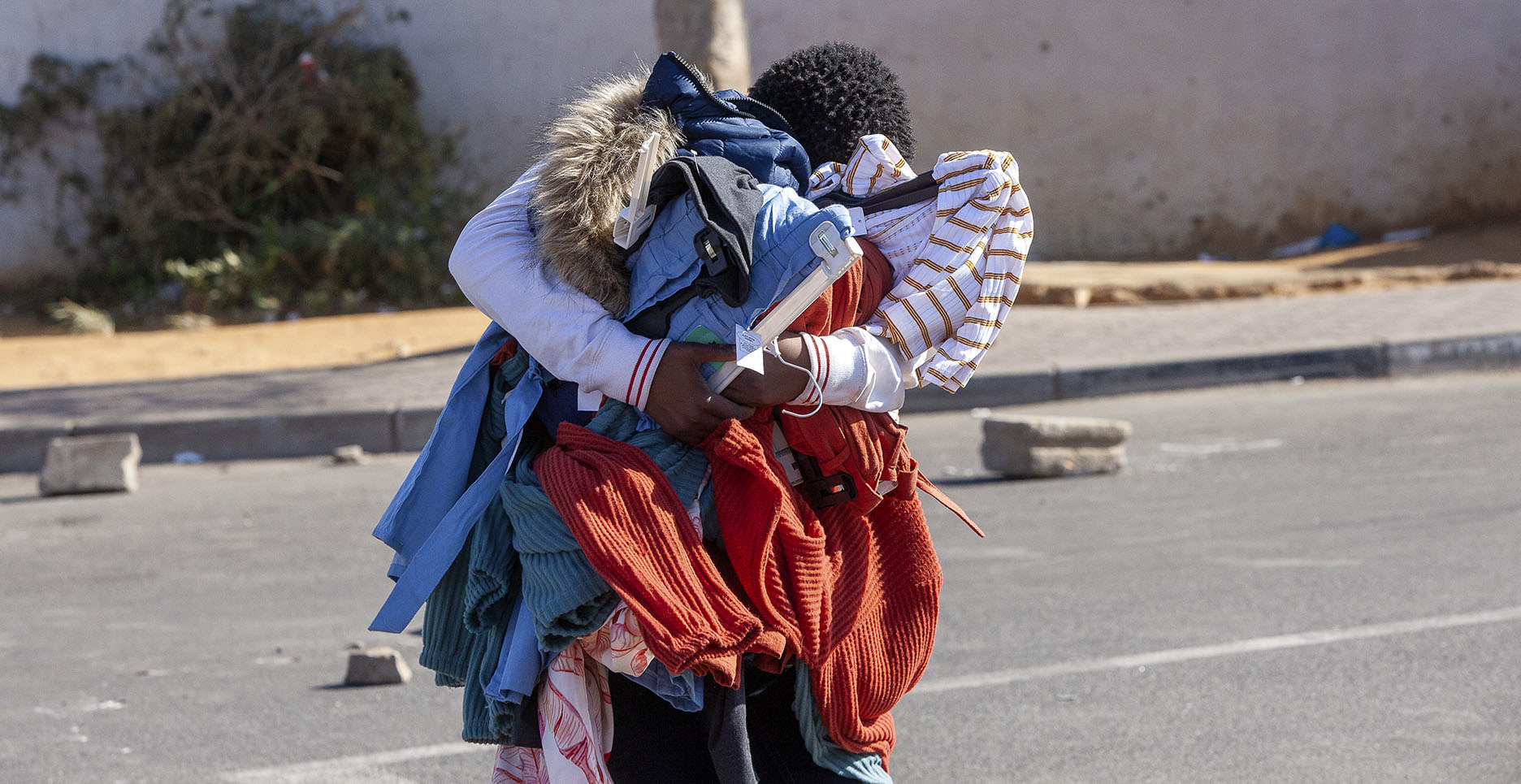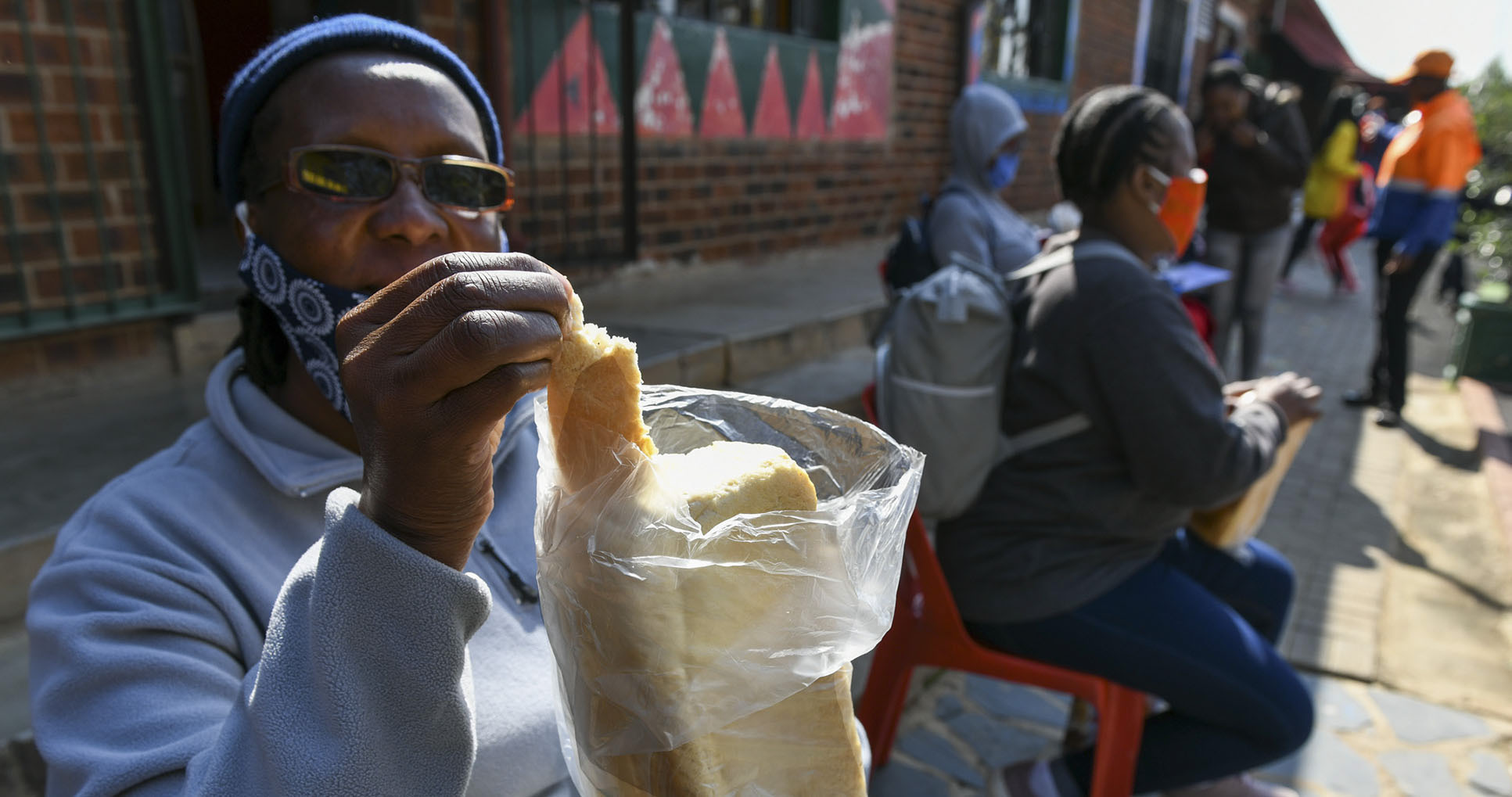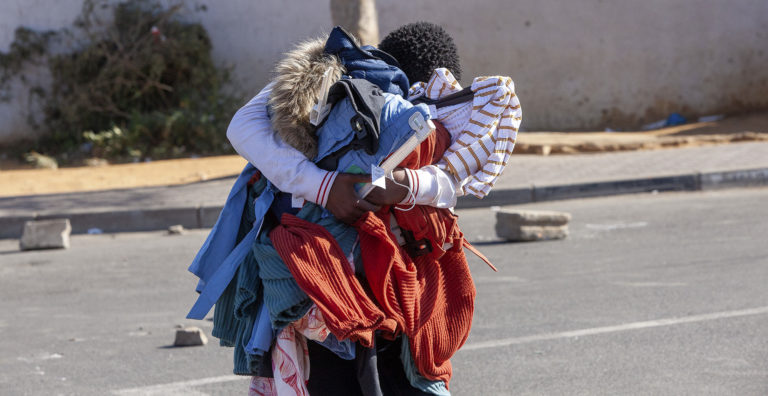Soldiers detain two youngsters suspected of looting at Diepkloof Square in Soweto on 13 July 2021, as the South African National Defence Force is deployed around Gauteng and KwaZulu-Natal amid violent protests. (Photo: Shiraaz Mohamed)
Tshabalira Lebakeng is a journalist who lives in Orlando, Soweto, where he rents a small backyard room. He doesn’t have a regular job and has been robbed more times than he can remember. He writes about his encounters with people looting shops in Soweto, what they said to him and what young petty criminals say about why they engage in crime.
Life has been difficult for everyone since the pandemic began. Working or not working.
When you drive around Johannesburg, lots of people are sitting by the robots or at the mall gates looking for work. Hunger and stress are written on their faces. People are losing their jobs every day, so crime escalates.
We are living in an angry nation. The other day I was passing a group of young men who were talking about starting a protest over Zuma being in prison. I walked slowly to hear them better. With the streets full and everyone distracted, it was a good opportunity to get money and cigarettes, they said.
Yesterday, I heard people talking about what was happening in the malls. I was standing at my gate. People were running to their houses. Street sellers were putting their goods in bags to take back to their yards. They said they had heard people were taking things.

Soon on social media everyone saw it was happening in the malls. I heard people shouting, “Let’s go to Diepkloof Mall. Shoprite. Now is our chance.”
I was surprised when I saw two guys pushing a huge ice cream fridge, with “Shoprite Checkers Property” on it. When I asked them where they got it they told me it’s “Christmas at Shoprite”.
They told me they had no work and had been wanting this fridge for years. They want to open an ice cream business. Now they can collect what they need to start their business.
Then two young ladies came past with two trolleys full of groceries. Zaza (not her real name) is pregnant and asked me why I’m sitting when people are looting.
I told her I’m not that type of guy.
She said she isn’t either. But if she doesn’t steal something her baby won’t have nappies and milk and other baby products. The father of the child wants nothing to do with her or the baby.
Now she can eat, too, during the pregnancy. She doesn’t have to stress.
I asked her if she worried about getting shot by the police. She looked at me like I was crazy and laughed. She said the police told them to take whatever they wanted, they must just not hit them with stones.
“Bheki Cele, he’s at home with his family,” they had said. “We want to stay alive for our families, too.”

The other woman, Martha, said she had taken groceries to give to her grandmother, who lives in a horrible zinc shack. The carpets and cooking pots will help make her shack more comfortable. She has four kids to feed and the Sassa money is not enough. “At least her kids will get something to eat for a long period of time.”
She gave a big, joyful smile. “I am not doing this because I am a bad person. I just need food for my kids.”
‘Looting’ is a daily occurrence in poor communities
I’m living around Diepkloof and Orlando in a backyard room. Since I came to Jozi 10 years ago my life has been around here.
Every day there is a housebreaking. Stolen goods are sold all the time. In my area criminals come with a grinding machine. They don’t care if you have a gate or dogs. They cut the door and get in and take what they want.
When you call the police they can take two weeks to come.

I don’t trust the police because I see them every day robbing foreigners who own tuckshops. They threaten to send them home if they don’t give them a cigarette.
The community is frustrated, they don’t know what to do anymore. When you leave your washing on the line and go back to check if it’s dry, you find your clothes are gone. Nyaope boys take everything. It’s worse now because load shedding is giving us even more stress.
One night these two boys came to sell me a wooden door. I asked them what I must do with the door. They told me if I give them R50 they will make me good firewood with that door.
Next day they came with wet pyjamas.
The same day I heard a 19-year-old boy had been killed by the community because he stole a car battery. I asked myself if it was necessary to kill that boy for a car battery.
People are building high walls to try to protect themselves from the criminals. But high walls don’t help. Criminals staan en kyk. They check the family schedule. What time they go to work and what time they come back.
I have my working table next to a window. One day I left my laptop bag on the table and when I came back it was gone. I found out the boy next door was the one who took my things. I was angry because that boy’s family came to us when they had no food. My laptop and iPad were sold for R250 at Zola North.
Why steal?
I asked the boys who are stealing, why are they doing this?
One of them, David (not his real name) told me in a sorry and sad voice that his father lost his job in May so he needs to take over and care for the family. His father didn’t receive any benefits and he is so stressed he shouts every day.
David doesn’t like to see his mother humiliated like that.
Jabu (not his real name) told me he hijacks cars because he has no job. He has to make a plan to get food three times a day. His grandmother died and with her, her income. What stresses David a lot is that his 15-year-old sister is dating an old grandfather because of hunger. David told his sister to stop selling herself to the devil and he would hustle for her.
Themba (not his real name) told me had a good education. But he doesn’t want to work for little money. You work and then you have to give taxes to the government and they just steal it. He’s got two brothers. He waits for them to go out and rob. When they come back successful, it is his job to make sure the things are sold within a day or two. They call him snyman. He told me that in lockdown people need alcohol and cigarettes. So they rob taverns. They know in one day they will make thousands of rands. Even police are buying from them.
I asked him: “What if you get killed in the mission?” He replied: “Inja nenja inelanga layo malume” (“A dog, it’s got its own day, my uncle”).
I asked him how long he will do this?
He told me forever if he needs to.
All the guys I spoke to said that people in high office in government are stealing billions, so who will stop them “eating whatever they find in a basket”?
I was emotional when I looked at these young boys. I felt heartbroken looking at these clever boys. Just fighting to stay alive in this broken country.
Between Orlando and Noordgesig highway around 9pm, no one ever walks that side. It is open season. If you walk there you will be a victim. Get robbed or stabbed. If you are lucky you will get help on time. But these days people don’t go out if they hear someone screaming or asking for help. You don’t know if it is a trap or a real emergency.
Everything is stolen and sold. You go into your yard and the rubbish bin is gone. Pikitup charges R500 for a new one but you can buy one on the street for R50.
Indlala ibanga ulaka. Hunger makes you angry, a young boy, Siphiwe (not his real name), told me. He used to steal other kids’ cellphones and money at school. He says his mother was not working, so he didn’t have lunch money or his own lunchbox. It started as a one-day thing – he took a teacher’s expensive phone and sold it in town for R500.
It was the first time he had held that much money. He went to a butcher and bought meat and groceries to impress his mother and siblings.
After that it became a continuous thing. I asked him if he didn’t feel sorry for his victims when they cried, looking for their belongings. He just looked at me and said: “Uncle, inyoni yakhela ngezi nsiba zenye inyoni” (“To survive you need to take risks”).
In 2019, a gentleman asked him to wash his car. But it happened that the gentleman left his phone in the car. When he saw the phone he was tempted. He took the phone and gave it to his friend to sell. But when the owner of the car returned he saw his phone was missing.
The police took Siphiwe. He wasn’t able to write his final Grade 11 exams.
Even shopping for groceries in the evening during winter when it is dark. When you open a taxi door and if you put your plastic bag on the ground, it’s gone in five seconds. And down the road someone is running like a hungry dog with your bag of groceries. So you need to wait or starve until the next time you get some money.
One day I was coming from the shops with some groceries. Some cops stopped me and asked me if I could buy them a cold drink. I told them I don’t have money. They told me I must show them shop slips to check my groceries were not stolen. They said we know where you live and when you need cops we won’t come. The people we trust to protect us are the ones who are robbing us.
I am a writer, hustling to get work. But I can never take my laptop with me anywhere. I know I won’t come back with it. If I have to, I put it in an old shopping bag. I don’t know how many times I have been robbed. I think even the tsotsi know me now.
I don’t go to the police anymore because they always ask me if I know the people who mugged me. Or why was I walking alone in that side of town. Once the police told me there is no chance of arresting cellphone and laptop criminals.
“Just buy a new one,” the cop said.
Everywhere I go I take my kitchen knife because I need to fight back. I can’t be a victim every year
Tshabalira Lebakeng is part of the Homeless Writers Project co-ordinated by Harriet Perlman.
Source: . DM/MC

